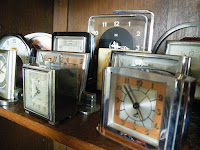Yesterday on the news, I learned about a project and an exhibition that is coming to an end that illustrated the nuanced relationship among humans and machines through one purpose-built scribe. For several months, a robotic-arm from a research laboratory in Karlsruhe has been reproducing the Luther Bible in an early Renaissance hand on a very long, continuous scroll of parchment. Visitors to the exhibition were able to watch the robot in action, and this is not the first time that the research company has offered man-machine engagements meant to spur the imagination and blur preconceptions about interaction, including several parties hosted by robotic disc-jockeys.
Tuesday, 7 February 2012
dexterity or hand-jive
Monday, 6 February 2012
sexagennial or diamond jubilee
catagories: 🇬🇧, 🇮🇲, holidays and observances, lifestyle
Sunday, 5 February 2012
docking bay 94 or suitable for framing
 These two works from John Mattos, first reimagining Pablo Picasso's the Three Musicians with the Figrin D'an Band and other elements from the Cantina at Mos Eisley and then Marcel Duchamp's iconic abstract painting with C-3PO descending a staircase, are among the best.
These two works from John Mattos, first reimagining Pablo Picasso's the Three Musicians with the Figrin D'an Band and other elements from the Cantina at Mos Eisley and then Marcel Duchamp's iconic abstract painting with C-3PO descending a staircase, are among the best.Saturday, 4 February 2012
what time is it, ma?
catagories: antiques, networking and blogging
retracta and rokovania
 The Slovenian signatory, the ambassador to Japan, has released a public apology (in English), first to her children and then to her fellow-citizens for having committed their futures to such a far-reaching atrocity in one of the most articulate, heart-felt and honest statements from a politician that I have had the pleasure of reading in some time. All statecrafters ought to take note. It is the public's duty to snoop around what makes the headlines and is writ large and one cannot rely on go-to journalism to reveal every back-room deal that is coming out of Davos, the EU Parliament or the US Congress, which have all been scuttled in the media as something dull and irrelevant by design, but some of the terms of ACTA would make such snooping harder, and hopefully these rallies can draw the needed attention to what national leaders are consigning their people to.
The Slovenian signatory, the ambassador to Japan, has released a public apology (in English), first to her children and then to her fellow-citizens for having committed their futures to such a far-reaching atrocity in one of the most articulate, heart-felt and honest statements from a politician that I have had the pleasure of reading in some time. All statecrafters ought to take note. It is the public's duty to snoop around what makes the headlines and is writ large and one cannot rely on go-to journalism to reveal every back-room deal that is coming out of Davos, the EU Parliament or the US Congress, which have all been scuttled in the media as something dull and irrelevant by design, but some of the terms of ACTA would make such snooping harder, and hopefully these rallies can draw the needed attention to what national leaders are consigning their people to.
catagories: 🇪🇺, 🥸, foreign policy, graphic design, networking and blogging
Friday, 3 February 2012
dibba, dubai, abu dhabi
Tensions mounting over the flow of traffic through that potential choke-point of the Strait of Hormuz come from a wide array of trajectories, with a lot of significance and history not only in tow but also projecting, deferring antagonism into some imagined and virtual future. The arts, cultures, diplomacies, histories and scholarship of the people of Persia, as it is for a lot of other peoples of the region, have been saddled with a great unplumbed and sad ignorance on the part of many outsiders and reckon their story only begins with twilight colonialism and the framework of shoves and tugs of foreign policy.
catagories: foreign policy, revolution, technology and innovation, transportation

















